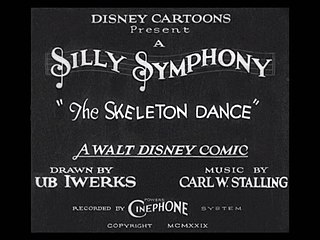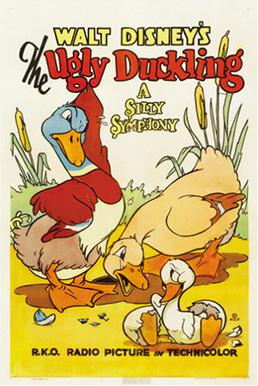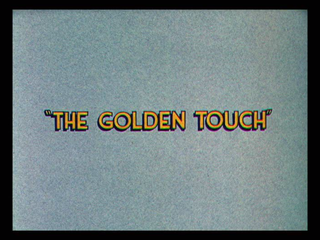Related Research Articles
Silly Symphony is an American animated series of 75 musical short films produced by Walt Disney Productions from 1929 to 1939. As the series name implies, the Silly Symphonies were originally intended as whimsical accompaniments to pieces of music. As such, the films usually did not feature continuing characters, unlike the Mickey Mouse shorts produced by Disney at the same time. The series is notable for its innovation with Technicolor and the multiplane motion picture camera, as well as its introduction of the character Donald Duck making his first appearance in the Silly Symphony cartoon The Wise Little Hen in 1934. Seven shorts won the Academy Award for Best Animated Short Film.

The Skeleton Dance is a 1929 Silly Symphony animated short subject produced and directed by Walt Disney and animated by Ub Iwerks. In the film, four human skeletons dance and make music around a spooky graveyard—a modern film example of medieval European "danse macabre" imagery. It is the first entry in the Silly Symphony series. In 1993, to coincide with the opening of Mickey's Toontown in Disneyland, a shortened cover of the cartoon's music was arranged to be featured in the land's background ambiance. The short's copyright was renewed in 1957, and as a published work from 1929 it will enter the US public domain on January 1, 2025.

Babes in the Woods is a 1932 Silly Symphonies animated film.

Three Little Pigs is a 1933 animated short film released by United Artists, produced by Walt Disney and directed by Burt Gillett. Based on the fable of the same name, the Silly Symphony won the 1934 Academy Award for Best Animated Short Film. The short cost $22,000 and grossed $250,000.
Music Land is a Silly Symphony animated Disney short released in 1935.

The Ugly Duckling is an animated short film by Walt Disney, based on the 1843 fairy tale "The Ugly Duckling" by Hans Christian Andersen. The film was directed by Jack Cutting and Clyde Geronimi, and released in theaters on April 7, 1939. Music was composed by Albert Hay Malotte, who was uncredited for the film. The animated short was first distributed by RKO Radio Pictures, and was shown with Love Affair.
Midnight in a Toy Shop is an American 1930 Silly Symphonies animated short film directed by Wilfred Jackson and produced by Walt Disney Productions.

The Golden Touch is a Walt Disney Silly Symphony cartoon made in 1935. The story is based on the Greek myth of King Midas, albeit updated into a Medieval setting. It was the last film directed by Disney.

Dawn of the Mummy is a 1981 American horror film directed by Frank Agrama, who also served as writer and producer on the film. While not prosecuted for obscenity, the film was seized and confiscated in the UK under Section 3 of the Obscene Publications Act 1959 during the video nasty panic.
The Grasshopper and the Ants is a 1934 American animated short film produced by Walt Disney Productions and released by United Artists. Part of the Silly Symphonies series, the film is an adaptation of The Ant and the Grasshopper, one of Aesop's Fables. It was directed by Wilfred Jackson and stars Pinto Colvig as the voice of the grasshopper Hop.
Mother Pluto is a Silly Symphonies cartoon released on November 14, 1936, directed by Wilfred Jackson. The cartoon features Pluto.

Three Blind Mouseketeers is a Silly Symphonies cartoon based on the nursery rhyme Three Blind Mice and the 1844 novel The Three Musketeers by Alexandre Dumas. Directed by Dave Hand and Jack Cutting, it stars Billy Bletcher.
The Flying Mouse is a Silly Symphonies cartoon produced by Walt Disney, directed by David Hand, and released to theatres by United Artists on July 14, 1934. The use of color here was rather innovative as it is set during the course of a single day.

The Robber Kitten is a 1935 Walt Disney Silly Symphonies cartoon, directed by David Hand.
Springtime is a Silly Symphonies animated Disney short film. It was released in 1929. It was the third Silly Symphonies film to be produced, just five days before the 1929 Stock Market Crash. The short's copyright was renewed in 1957, so it will enter the US public domain on January 1, 2025.
Monkey Melodies is a Silly Symphonies animated Disney short film. It was released in 1930 as the 13th film in the Silly Symphony Series.

Woodland Café is a Silly Symphonies animated Disney short film. It was filmed in Technicolor and released by United Artists in 1937 and was re-issued by RKO Radio Pictures in 1948. While it contained no on-screen credits, Wilfred Jackson was the director and Leigh Harline was the musical director.

The Department of Egyptian Antiquities of the Louvre is a department of the Louvre that is responsible for artifacts from the Nile civilizations which date from 4,000 BC to the 4th century. The collection, comprising over 50,000 pieces, is among the world's largest, overviews Egyptian life spanning Ancient Egypt, the Middle Kingdom, the New Kingdom, Coptic art, and the Roman, Ptolemaic, and Byzantine periods.

The Haunted House, also known as Haunted House, is a 1929 Mickey Mouse short animated film released by Celebrity Productions, as part of the Mickey Mouse film series. The cartoon was produced by Walt Disney Productions and distributed by Celebrity Productions. It was the fourteenth Mickey Mouse short to be produced, the eleventh of that year.
Hell's Bells is a 1929 animated short film was directed by Ub Iwerks and produced by Walt Disney. It was distributed into cinemas by the film company Columbia Pictures, who would also distribute other Walt Disney films, such as Winter. The film follows Satan and the other devils' happenings in Hell. One of these devils revolts against Satan, and end up kicking him off the cliff of Hell at the end of the film. The short is part of short film series Silly Symphonies.
References
- 1 2 Merritt, Russell; Kaufman, J. B. (2016). Walt Disney's Silly Symphonies: A Companion to the Classic Cartoon Series (2nd ed.). Glendale, CA: Disney Editions. pp. 96–97. ISBN 978-1-4847-5132-9.
- ↑ "Talking Shorts". Variety : 13. February 23, 1932. Retrieved February 23, 2020.
- ↑ "Silly Symphonies: The Historic Musical Animated Classics DVD Review". DVD Dizzy. Retrieved February 20, 2021.